Here’s a look at all the new RPGs and strategy games released in the past few days that, in my humble opinion, deserve a mention.
This week brings plenty of fun and interesting titles to check out, from a tactical RPG with a gladiator twist to a roguelite RPG inspired by HeroQuest and even an indie strategy game that channels the spirit of the original X-COM series with a fantasy touch, plus much more.
Eclipse Breaker

I’ll start the article with the one title on this list that isn’t turn-based. It’s a real-time RPG that uses a sort of ATB system with free movement. It’s called [Eclipse Breaker](https://turnbasedlovers.com/overview/real-time-amp-turn-based-co…
Here’s a look at all the new RPGs and strategy games released in the past few days that, in my humble opinion, deserve a mention.
This week brings plenty of fun and interesting titles to check out, from a tactical RPG with a gladiator twist to a roguelite RPG inspired by HeroQuest and even an indie strategy game that channels the spirit of the original X-COM series with a fantasy touch, plus much more.
Eclipse Breaker

I’ll start the article with the one title on this list that isn’t turn-based. It’s a real-time RPG that uses a sort of ATB system with free movement. It’s called Eclipse Breaker, and it leans hard into its combat first.
This is an action roguelite where every encounter runs on dodges, parries, and precise timing, wrapped in a JRPG-style ability kit that grows as players unlock new weapons and elemental powers.
Companion Spirits act as modular perks tied to Ember’s past allies, shifting builds from run to run, while procedurally generated realms and a separate Boss Rush mode focus on learning patterns, not grinding numbers.
Only after that rhythm settles in does its hook land: Ember returns 25 years after a failed war against Solara, loading what is framed as an old save file and climbing through the domains of fickle gods to end an eclipse left unresolved.
The deliberate PlayStation-era presentation underlines that idea of unfinished business rather than playing retro for nostalgia’s sake. Developed by Lunar Workshop and Jorge Rodriguez, published by Lunar Workshop, Eclipse Breaker launches on PC via Steam on November 7, 2025.
Next Run
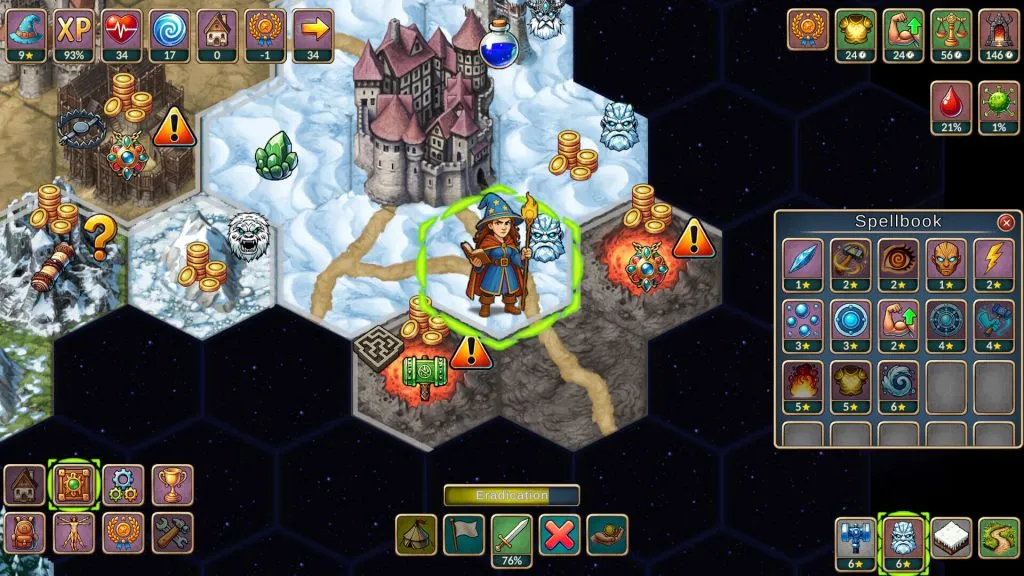
Next one is Next Run (sorry, but I needed to write this), a strategy game that builds itself around choice before anything else. Every core system has an alternative: players can fight or bribe demonic forces, lean on crafted gear or focus on trade, invest in buildings or channel magic, pick from seven classes that cover frontline, support, economy, and necromancy, and shape a squad that reflects those priorities.
Tactical missions, resource management, crafting, diplomacy, and regional perks all feed into a flexible ruleset designed for multiple solutions rather than a single optimal path.
That structure sits on a procedurally generated world where the Gates of Hell have already opened and humanity pushes back from the brink, with players expanding influence, clearing ruins, and targeting key threats to stabilize pockets of resistance.
Developed and published by Clarus Victoria, the game released on November 6, 2025 for PC via Steam with Windows, macOS, and Linux support, and uses its roguelike elements to keep each campaign run distinct.
Dark Quest 4
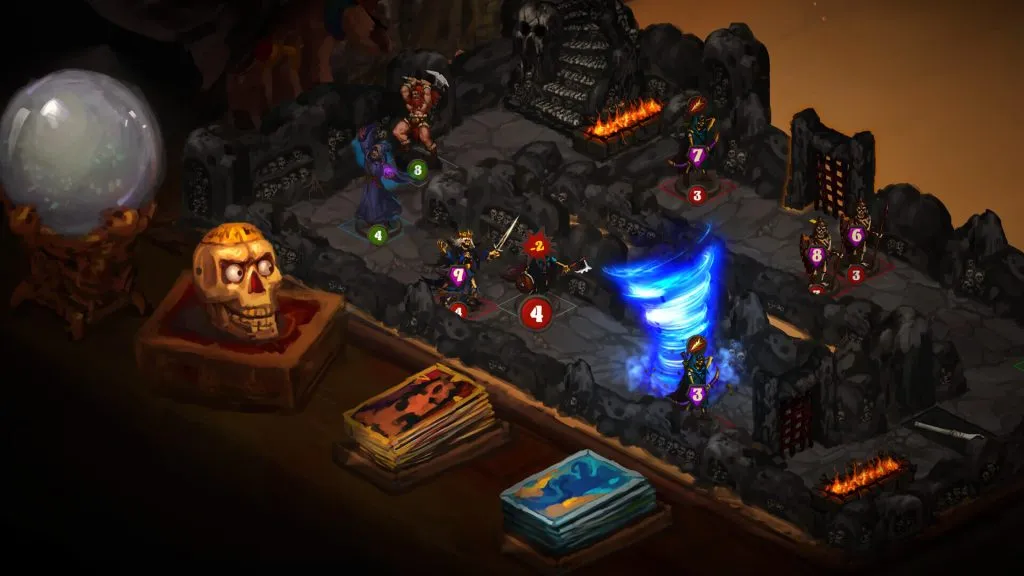
One of the most interesting titles this week is definitely Dark Quest 4, which treats its campaign like a digital board game box.
Thirty handcrafted quests, more than forty enemy types, a Dungeon Master narrator, and up to ten playable heroes create a tabletop-style crawl where players move through multi-floor dungeons, trigger events, skirt traps, and resolve turn-based battles with clear positioning and synergistic skills.
Online and local co-op for up to three players, plus a Hero Camp for upgrading decks and abilities, turns each group into a tuned party built for specific scenarios.
On top of that foundation, Brain Seal leans into longevity with a full campaign about Gulak and the Dark Sorcerer’s spreading influence and a Creator Mode with Steam Workshop support so players can script their own quests and mini-campaigns.
The result is less a one-and-done sequel and more a platform for modular dungeon runs, available on PC via Steam and consoles, including PlayStation, Xbox, and Nintendo Switch, from November 5, 2025.
Bloodgrounds (Early Access)
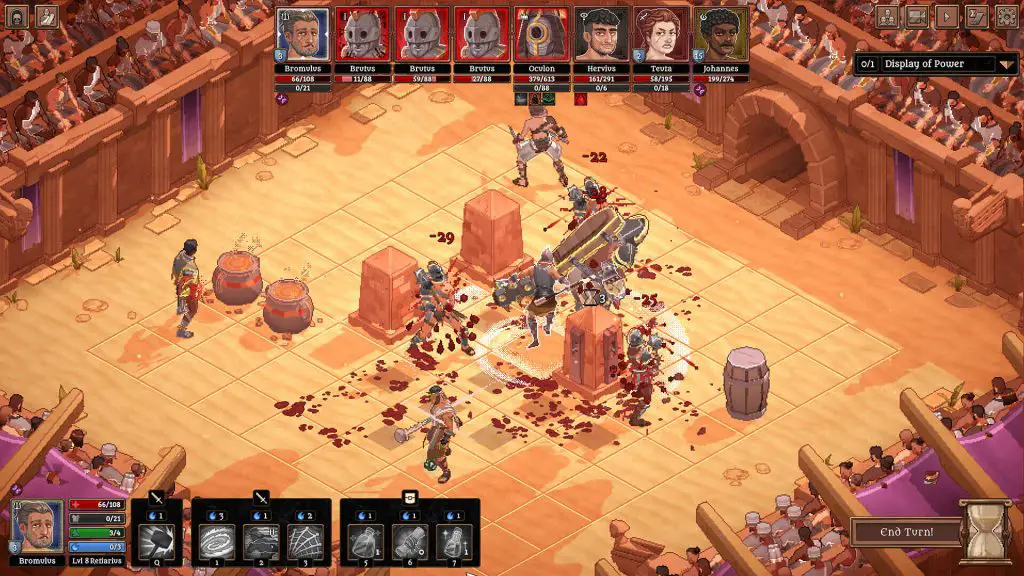
Even though it’s only in Early Access for now, the release I’ve been looking forward to the most is Bloodgrounds. In this strategy RPG, players run a gladiator house and expand Marevento from a shabby coastal outpost into a city-state, investing in thirteen building types across five Ages, courting patrons, and sharpening the economy to keep steel and bodies flowing.
All of this is driven by a former slave-turned-magnate set on tearing down a depraved Emperor, so narrative progress and city growth move in step with each decision made behind the arena.
Matches then play out as grid-based, turn-based battles with initiative, action points, line-of-sight tools, environmental hazards, deity powers, and dirty tricks purchased through contacts.
Gladiators span physical, ranged, and magical archetypes with fifteen progression tiers and persistent injuries, and permadeath turns each loss into a real setback rather than a number on a screen.
Developed by Exordium Games and published by Daedalic Entertainment, Bloodgrounds launched into Early Access on PC via Steam on November 5, 2025, with the full narrative arc already present and balance planned to evolve with player feedback.
The Fable: Manga Build Roguelike

Maybe the less famous of this article is The Fable: Manga Build Roguelike. A quite original project where players do not pick skills from menus; they place manga panels on a page, building sequences that define movement, attacks, and utility in tight, puzzle-like encounters that read visually like the original comic.
Akira, Yoko, and Suzuki come in as distinct toolkits that shift how those layouts behave, keeping the focus on clarity and control rather than spectacle.
Each run introduces new panels, damaged pages that block placement, and strict turn limits that reward efficient planning, while optional minigames and events offer ways to refine decks between fights.
A dedicated Puzzle Mode strips randomness almost entirely, offering fixed challenges that highlight the underlying tactics for players who want pure optimization. Developed by MONO ENTERTAINMENT and published by Kodansha, it was released on November 5, 2025, on PC via Steam.
Shadows of Thornkeep (Early Access)
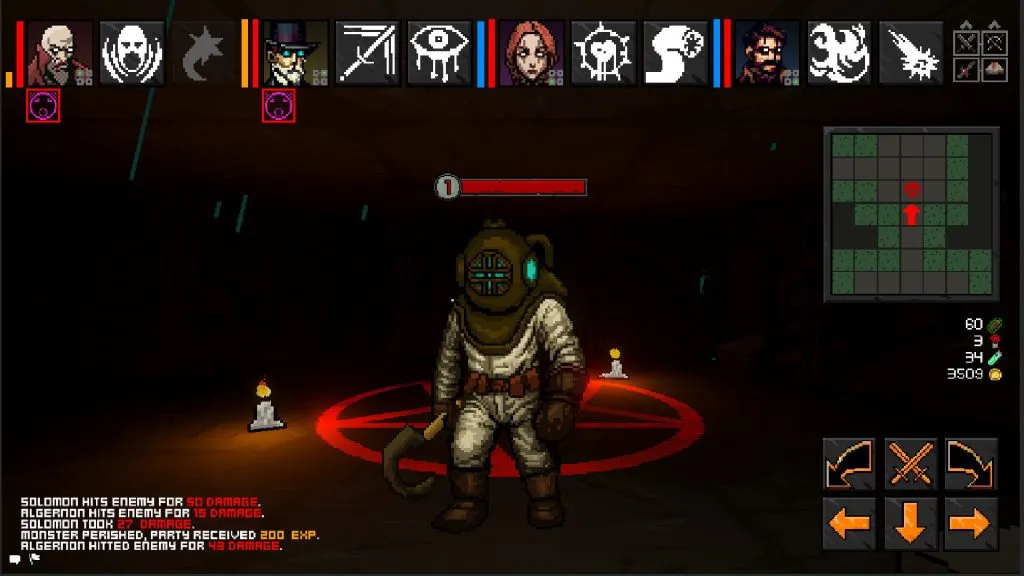
The surge of new first-person dungeon crawlers has been a real treat, and among this wave we find an intriguing RPG that debuted in Early Access this week.
Shadows of Thornkeep keeps its pitch simple: short, focused dungeon crawls on a cursed island, built to feel old-school without burying players in systems.
From a fragile camp, a band of bound souls heads into veiled forests, flooded tunnels, and fortress halls in first-person, grid-based fashion, with each expedition tuned to last minutes rather than hours while still selling the bleak mood.
Beneath that accessibility sits a rogue-lite loop where death sends survivors back to camp instead of wiping progress, but reviving and preparing the party always eats into resources, pushing players to balance risk and reward.
Handcrafted maps, turn-based combat, loot, cursed relics, and incremental upgrades define the Early Access build, which launched for PC via Steam on November 3, 2025, from solo developer Tryzna83, with ongoing updates already smoothing difficulty and interface.
Slaves of Magic
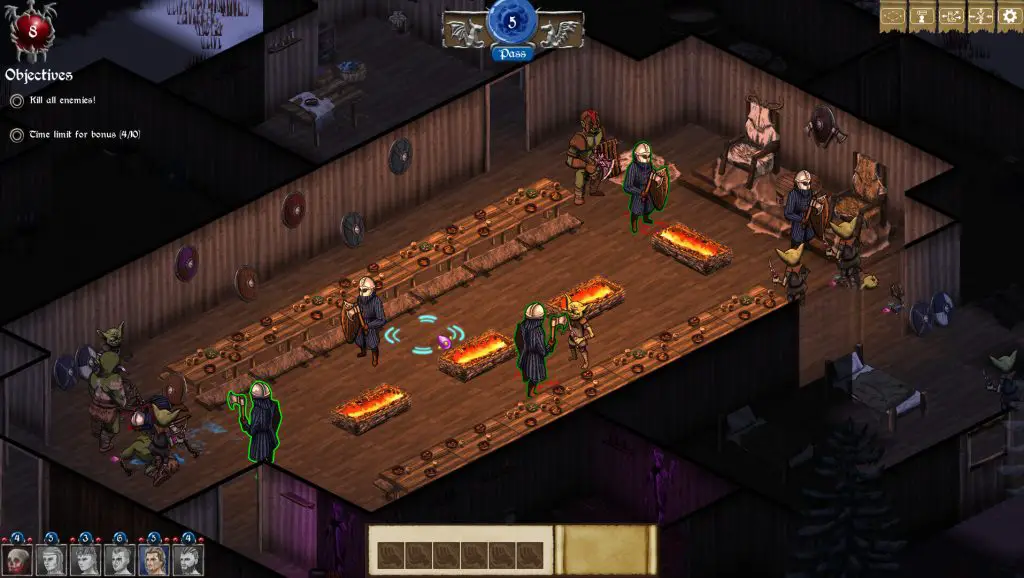
And finally, there’s Slaves of Magic, a game that aims to bring the X-COM formula into a fantasy setting, an idea I’ve always really loved.
As happened in XCOM 2, the invaders have already won, their magic and constructs occupying the continent, and players lead a resistance that must operate from the shadows: scouting regions, securing hideouts, making contact with locals, and deciding which fronts to support with limited time and supplies.
The occupied world changes under pressure from multiple enemy factions, so the broader war map matters as much as any single mission.
On the ground, missions play out as turn-based tactical battles with a flexible progression model instead of rigid classes. Fighters learn weapon styles and archetype traits, then combine skills, armor, and tools into bespoke builds that favor positioning, timing, and synergy.
Procedural elements, permadeath, and constrained access to upgrades push players to think across an entire campaign, not just one skirmish, as they guide the resistance through an open-ended struggle.
Developed and published by Amethyst Dreamers, Slaves of Magic was released on PC via Steam on November 2, 2025.